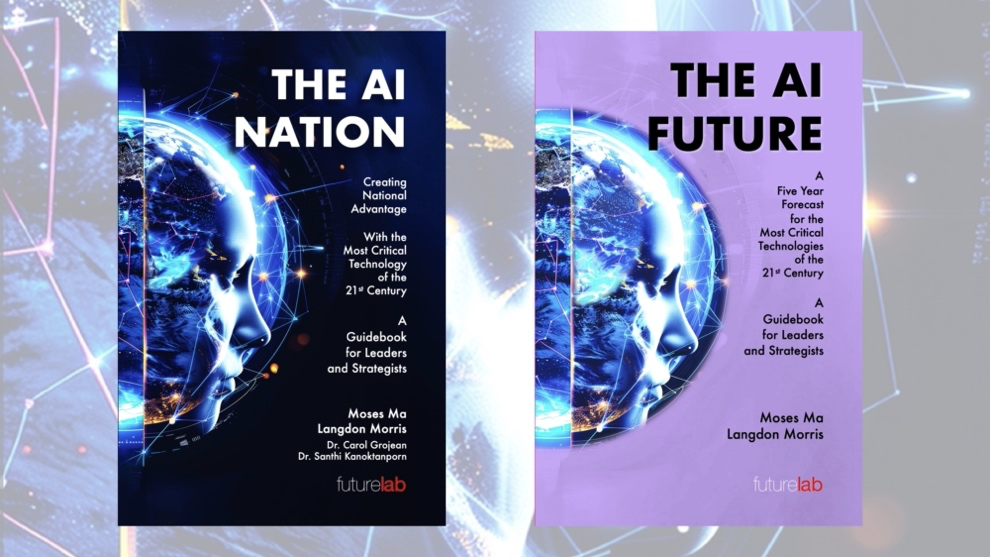How Do We Handle AI in Education?
InnovationLabs Newsletter, May 2025
Every sign continues to indicate that AI is beginning to have transformative impact across all facets of society. The only reasonable assumption now is that this will increase and accelerate.
Given the magnitude of what’s coming, a lot of people are starting to think about how to prepare. Which means education, and the need for large-scale educational programs.
The UAE and China have already announced nation-wide educational efforts, while a group of more than 250 CEOs of American companies are proposing the same for the US. Here are some of the fascinating details.
AI Education in the UAE: A Leadership Move
A fascinating announcement was made on May 4, 2025 by His Highness Sheikh Mohammed bin Rashid Al Maktoum, Vice-President and Prime Minister of the UAE:
“The UAE Cabinet has officially approved the integration of Artificial Intelligence (AI) into the national curriculum for all government schools beginning in the 2025-2026 academic year. This initiative not only reflects the nation’s ambition to lead in technological advancements but also aims to furnish students with essential skills needed to thrive in an increasingly digital landscape. The curriculum will cover:
Understanding Data and Algorithms: Students will learn the basics of how data drives AI and the algorithms that process it.
– Software Applications: Insight into the various software tools powered by AI will allow students to see real-world applications.
– Ethical Awareness in AI: Discussions around the moral implications of AI technology will foster a responsible approach to its utilization.
– Real-World AI Applications: Case studies and practical applications will enable students to see AI in action, bridging theory with practice.
– AI-Driven Innovation and Project Design: Students will engage in project-based learning, developing their own AI-driven solutions to real-world problems.
– AI Policies: Awareness of the regulatory landscapes that govern AI technology will prepare students for working within professional frameworks.
– Social Engagement: Promoting dialogue about the impact of AI on society will help students become critical thinkers and responsible citizens in a tech-centric world.”
AI Education in China
Under the Beijing Municipal Education Commission’s plan, elementary schoolers will be enrolled in hands-on introductory courses for artificial intelligence, middle schoolers will learn how to apply AI in their schoolwork and daily lives, and high schoolers will focus on strengthening innovation in the field.
Mandatory AI Education: Starting in the fall of 2025, Beijing will implement mandatory AI training for all students, including elementary school students.
Hands-on Introductory Courses: Elementary school students will be enrolled in hands-on introductory courses designed to familiarize them with basic AI concepts.
Minimum Instruction Time: Schools will provide a minimum of eight hours of AI instruction per academic year.
Integration: The AI curriculum may be taught as a standalone course or integrated into existing subjects like information technology and science.
AI Education in the US
More than 250 CEOs in the US have signed an open letter proposing that computer science and AI should become mandatory subject in the curriculum of every school in the US. (And they’re not all CEOs of technology companies.)
“In the age of AI, we must prepare our children for the future — to be AI creators, not just consumers. A basic foundation in computer science and AI is crucial for helping every student thrive in a technology-driven world. Without it, they risk falling behind.”
AI Education in Europe
To date, Europe has been very proactive in defining the importance of ethics and inclusiveness in educating their students about AI, but not a single nation has yet defined mandatory AI educational programs for its youth.
What We Think It Means
When change occurs in a society, it tends to be easier for non-democratic countries to adopt new policies to fit the new order of things than it is for democracies. Unless there is some sort of monumental, life-changing event, decision making in democracies is slow and painstaking. Lots of campaigning and lobbying is needed to awaken the slumbering bureaucracy and get the various parts of the government aligned around the need to do something. In an autocracy, on the other hand, all it takes is a decision by one person.
The US was jarred into action when the Soviets launched their Sputnik satellite, and a little over a decade and billions of dollars later, an astronaut was hitting golf balls on the moon. Possibly this is a useful reference point for today.
This suggests that we’re in a “learning arms race” now, and if the UAE’s and China’s leaders are correct, AI will be one of the most critical differentiating factors that will shape the future of any nation or society.
In line with this view, in our recent work for the Government of Thailand we also have emphasized that educating the citizens throughout their nation on what AI is, and does, and means is going to be a critical competitive factor going forward. In our report to the government we have (very) strongly advocated for government policy to support a nationwide educational effort.
As of tomorrow, these are what we would likely call simply table stakes. If you can’t attain widespread AI education as a basic requirement, you’re probably not even going to be in the game. It’s a rather blunt warning, and we’re very interested to know if you agree with this. Please let us know your thoughts.
There are two further dimensions of this that are particularly interesting.
First, the unique quality that makes AI so powerful is precisely its capacity to learn so fast. Google trained AI Agent One to play the ancient game of Go by giving it the entire library of 30 million moves in all the games that had ever been recorded, and that agent quickly became unbeatable. Then Goole trained a different AI agent to play Go, but for the second one it only gave the rules, and instructed Agent Two to play games against itself. Agent Two defeated Agent One in one hundred straight matches. Agent Two learned its skills in a mere seventy-two hours. This capacity to learn is what makes AI such a formidable factor, and so when we teach AI what are we teaching? We’re teaching people how to accelerate their own learning.
The significance of this can hardly be overstated. It affirms what historians and economists and indeed all scholars know intuitively, which is that what you know, and how fast and effectively you can learn even more, is THE thing to focus on.
And second, the obvious thing to do is therefore to use AI to teach people how to use AI. This is what we have proposed for Thailand, and it’s described in detail in our forthcoming book The AI Nation, which will be out by the middle of May, along with its companion volume The AI Future.
Yes indeed, these are exciting times that we’re living in!
As always, thanks for reading, and thanks for checking out all the videos on our YouTube Channel, AI Impact and Strategy.
We always welcome your comments. Please contact Langdon at LMorris@innovationlabs.com to learn more.
Subscribe to our Newsletter!
Kid Running Image by Anne-marie Ridderhof from Pixabay
Students Racing Image by Thomas Wolter from Pixabay





